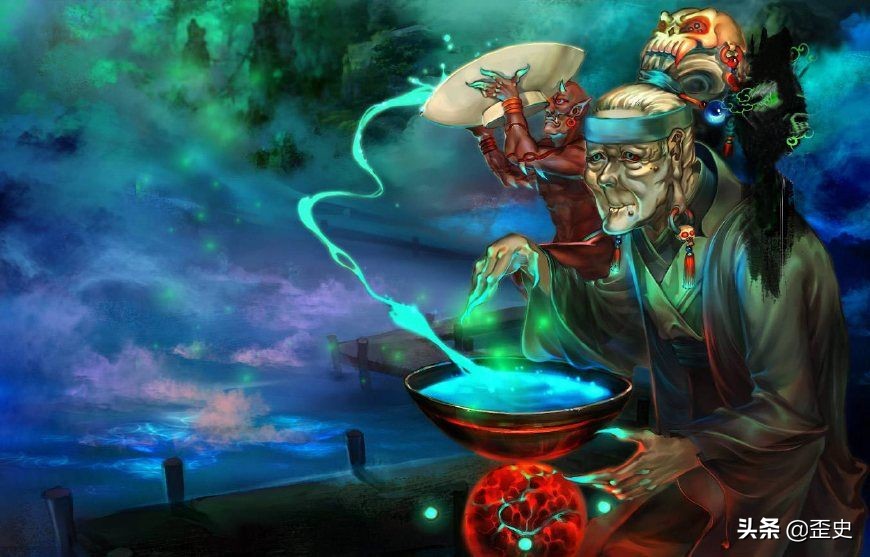Forget That Girl (original) (raw)

Today, I’d like to talk about Meng Po, a Chinese goddess who makes an appearance in Katie Zhao’s Fallen Hero. She’s a resident of Diyu, the underworld, which combines Taoist and Buddhist traditions. Meng Po makes a magic liquid that forces people to forget their past lives. Some sources call it soup and others tea, so there’s probably a translation issue at work here. Then again, I’ve heard that old vending machines made tea and soup that tasted pretty much the same. Regardless, it’s called Mi Hun Tang, and made of herbs and water from various ponds. It’s also said to have five different flavors. The lady in question lives near a narrow bridge that’s a few miles long, leading between different courts of Diyu.
The reason for the memory wipe is so a reincarnated spirit won’t be burdened by what had happened to them before, making her a largely beneficent figure, although that does vary somewhat. It’s also said that those who refuse to drink are restrained by demons and have the beverage forced down their throat through a copper tube. Some spirits do manage to slip through without a draft, however, which is linked with stories of babies born already able to talk. There’s obviously a clear similarity to the water of Lethe from Greek mythology, as mentioned here, for instance.
Lethe is one of the five rivers of the Greek underworld, said to flow through the cave of Hypnos, the god of sleep, as that also induces a certain amount of forgetfulness. I’ve seen that Meng Po’s name literally means “Old Lady Dream,” so if that’s true, there’s another common association. The word “lethargy” comes from the river. Some accounts say that the water is to make the shades in the underworld forget their earthly lives, but in the Aeneid, it’s specifically linked with reincarnation. In both cases, the liquid is presumably meant to explain why, if reincarnation is a thing, it’s not common to remember past lives. That kind of makes me wonder how anyone would even come up with the idea for reincarnation in the first place, but the origins of that are so far back and from so many different places that I don’t think there’s any surviving explanation for that. I do have to say that reincarnation seems a rather more practical system than just having souls remain in some spirit realm forever, but that doesn’t prove it’s true. Past life regression is a part of the whole New Age thing, but even then it’s presumably supposed to be the exception rather than the rule. Siddhartha Gautama is said to have remembered all his past lives through meditation. From the Greek side of things, there’s a reference here to the Myth of Er in Plato’s Republic, about a guy who never drank from the Lethe, and hence was able to describe the afterlife and process of reincarnation to others. The Orphic Mysteries mention that there’s another river, the Mnemosyne, which initiates will be able to drink from instead of the Lethe. I suppose I should also mention the Water of Oblivion in the Oz books, which has been used several times to give a villain a reset, although in the case of the Nome King it’s not all that effective.
There’s no association with death or reincarnation in this case, but the effect is much the same.
There are a few different origin stories for Meng Po, the one that came up the most often in my admittedly minimal research being that she was originally a woman named Meng Jiang, whose husband, Qi Liang or Fan Xiliang, was conscripted into imperial service building the Great Wall of China. When he didn’t return, she went out to find him, bringing along his winter clothes. She found out he had died, but was unable to identify him from among all the bones near, or sometimes inside, the wall, and her grief made a portion of the structure collapse.
She then jumped from the wall into the water and died.
Later versions of the story added that she committed suicide after Emperor Qin Shi Huangdi tried to force her into marriage, even though the basic tale predates his reign. The wall also wouldn’t have originally been the great one, but the popularity of the story increased when that was built. There’s also a variant where Meng was born from a gourd. This legend was probably originally separate from Meng Po, but you can see why this woman would be eager to remove people’s painful memories of life. Another account has it that she was a devout hermit who forgot everything about her life except her name. She’s also sometimes regarded as a wind goddess and daughter of Emperor Yao, who had her married to his successor Shun.
This entry was posted in Uncategorized and tagged aeneid, afterlife, death, demons, diyu, emperor qin shi huangdi, emperor shun, emperor yao, fallen hero, fan xiliang, great wall of china, hypnos, katie zhao, lethe river, meng jiang, meng po, mi hun tang, mnemosyne, myth of er, new age, nome king, orphic mysteries, plato, qi liang, reincarnation, republic, siddhartha gautama, souls, suicide, underworld, virgil, water of oblivion. Bookmark the permalink.